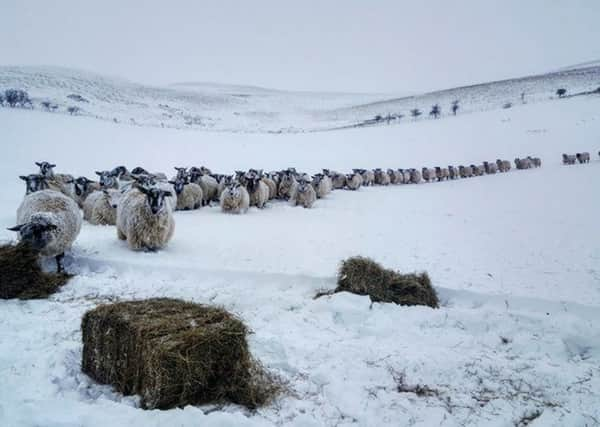Cold and wet weather taking toll on livestock


And the harsh conditions have taken their toll on livestock, with devastating effect.
Newborn lambs and pregnant ewes have been hit hard by the heavy snowfall and freezing temperatures.
Advertisement
Hide AdAdvertisement
Hide AdMarch is a peak month in the lambing calendar and farmers in north Northumberland have done their best to protect their animals against the elements.
But they admit that there have been significant losses, describing this year’s early spring season as the worst for a long time.
The cold conditions have also prevented grass growth, leaving farmers reliant on expensive silage to give ewes the nutritious food they need to feed their lambs.
April is still a crucial month for lambing, and those in the industry will be praying that the weather improves.
Advertisement
Hide AdAdvertisement
Hide AdBut there is no doubt that significant damage has been done over the last few weeks.
It’s not just sheep which have struggled either. Other livestock, such as cattle, has also suffered.
Mark Mather, who farms at Haugh Head Farm, in Wooler, said: “This is the worst March lambing I can remember. It has been terrible. It has been the worst possible combination for lambing – cold and wet, and it’s been persistent.
“One farm has quoted a 20 per cent loss of lambs. With where the agricultural industry is at the moment, farmers can’t afford to have that sort of loss and I think it has the potential to bankrupt farmers – it has been that severe in some areas.”
Advertisement
Hide AdAdvertisement
Hide AdMark, who is chairman of Wooler Parish Council, added: “The weather has put a great deal of stress on the sheep that are so heavy in lamb and it means that they are losing their condition. I also know some farmers who were running out of feed through the snow.”
Chris Curry, who farms at Low Burradon, agreed with Mr Mather’s assessment.
He said: “It is a very bleak situation. I have heard some horror stories and a lot of places further up in the hills have lost a lot of sheep.
“It is one of the worst Marches that I can remember and it has taken its toll on the sheep – they have taken it very badly.
Advertisement
Hide AdAdvertisement
Hide Ad“A whole raft of factors come into play, but a lot of people are struggling and this could be the final straw for a lot of people. There’s no doubt this has had a massive impact on everybody. You expect this weather in January and February, but the fact that it has come in March has made it a very long winter.
“It is the time of year when sheep are heavy in lamb and require feed and look for grass, but the grass isn’t growing because of the conditions.
“An early spring can make such a big difference, but when it is pushed back three or four weeks, like this year, and farmers are having to buy straw and feed – which is in short supply anyway – it is a big cost.”
He added: “As we start calving, we would look to put the cattle out to grass, but we can’t do that at the moment, because it is so cold and wet. So we are keeping them inside, but that has all sorts of implications, health and cost-wise.”
Advertisement
Hide AdAdvertisement
Hide AdAndrew Walton is vice-president of Glendale Show and farms at Preston Mains, Chathill. During the Beast from the East, 58 sheep had to be rescued after they were trapped by snow drifts. It took two-and-a-half hours to dig a track to reach them.
Mr Walton said: “This coastal strip has been hit worse this year than for a lot of years. The weather has created so much more work – we are having to hold sheep back in the sheds longer than we would like, which creates problems, because ewes like their own space.”
He doesn’t go along with the assessment that farmers could face bankruptcy on the back of the harsh weather.
“I wouldn’t over-egg it and farmers are resilient,” he said, but added: “A lot of people have struggled and it will have a severe impact on farmers’ cash flow this year. Even the marts, like Acklington and Wooler, had to close because of the weather, missing out on a whole week’s income.”
Advertisement
Hide AdAdvertisement
Hide AdNorthumberland farmers are encouraging consumers to support them, by buying locally and helping British agriculture.
Mark Mather said: “People have rallied around us in the snow, which is great, but they can also help with the bigger picture – by buying British and supporting British agriculture. The market is flooded with meat from New Zealand, which is cheaper, and makes it hard to compete.”
Chris Curry added: “It has never been the cheapest, because of the standards we have to meet and the extra costs we have, but I would encourage people to purchase British produce.”